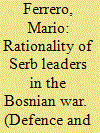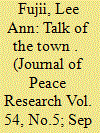| Srl | Item |
| 1 |
ID:
176284


|
|
|
| 2 |
ID:
167824


|
|
|
|
|
| Summary/Abstract |
This study explores the issue of interpreters’ positionality as outsiders to the forces’ personnel and insiders to the local communities. Twenty local interpreters who worked in the different peacekeeping operations (PKOs) in the Bosnian War, and seven members of the forces’ personnel were surveyed on their personal and professional background, their experiences with working conditions and training as well as the particularities and challenges of PKOs. The results indicate that the status, motivations, hiring procedures, and working conditions of the interpreters changed under the different PKOs, and that this had an impact on the positionality of the interpreter. The findings suggest that specific training programs are needed to better train interpreters to work in PKOs, and that consideration should be given to the issue of how to better train peacekeeping forces to work with interpreters.
|
|
|
|
|
|
|
|
|
|
|
|
|
|
|
|
| 3 |
ID:
103209


|
|
|
|
|
| Publication |
2011.
|
| Summary/Abstract |
The article investigates a critical case from the Bosnian war: the city of Tuzla, whose local government managed both to survive politically in the 1992-1995 war and to maintain its non-nationalist politics. In wartime, new political structures, legacies of the past, pre-existing institutions and networks, resources, and creative policymaking were used both for fostering and for defusing conflict. The article demonstrates that political moderation was difficult to accomplish and sustain, but it proved to be possible. The interplay of elite and grassroots agency reconstituted the political opportunity structure and policymaking was geared towards moderate politics that served to defeat powerful radical nationalist opponents.
|
|
|
|
|
|
|
|
|
|
|
|
|
|
|
|
| 4 |
ID:
151401


|
|
|
|
|
| Summary/Abstract |
This paper asks whether Bosnian Serb leaders’ choice to carry out a secession war in 1992–1995 was rational from the point of view of their stated goal of ethnic cleansing. We construct two indexes, one of ethnic purity and another of ethnic Serb concentration, and apply them to a counterfactual estimate of the outcome of ‘peaceful’ ethnic cleansing – what could have been achieved by population exchange based on pre-war territorial Serb power without war – in comparison to the actual outcome of the war. We find that the gross benefits of the chosen strategy of secession and war far exceed anything that could be achieved by the peaceful alternative. A conjectural assessment of perceived costs suggests that also net benefits were maximized by the war strategy. The implication for international deterrence policy is that credible judicial prosecution and punishment is the best way to alter the prospective perpetrators’ calculus.
|
|
|
|
|
|
|
|
|
|
|
|
|
|
|
|
| 5 |
ID:
155199


|
|
|
|
|
| Summary/Abstract |
How do people come to participate in violent display? By ‘violent display’, I mean a collective effort to stage violence for people to see, notice, or take in. Violent displays occur in diverse contexts and involve a range of actors: state and non-state, men and women, adults and children. The puzzle is why they occur at all given the risks and costs. Socialization helps to resolve this puzzle by showing how actors who have consciously adopted or internalized group norms might take part, despite the risks. Socialization is more limited in explaining how and why actors who are not bound by group norms also manage to put violence on display. To account for these other pathways, I propose a theory of ‘casting’. Casting is the process by which actors take on roles and roles take on actors. Roles enable actors to do things they would not normally do. They give the display its form, content, and meaning. Paying attention to this process reveals how violent displays come into being and how the most eager actors as well as unwitting and unwilling participants come to take part in these grisly shows. To explore variation in the casting process, I investigate violent displays that occurred in two different contexts: the Bosnian war and Jim Crow Maryland. Data come from interviews, trial testimonies, and primary sources.
|
|
|
|
|
|
|
|
|
|
|
|
|
|
|
|